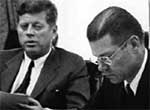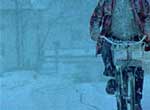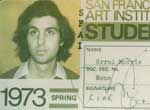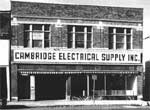March, 2006
No matter how despairing the tale, Errol Morris, the 58-year-old filmmaker and self-described "secular antihumanist," can't get enough of people and the wealth of stories they have to tell. "They're not adversarial interviews," Morris said by phone from Cambridge, Massachusetts, his home of 16 years. "They're interviews where I encourage people to talk at length."
His method-including having his subjects lulled into direct eye contact with the camera lens by speaking into a two-way Teleprompter-style device Morris affectionately dubbed the Interrotron -produces results as limitless as Morris's own curiosity. In addition to his seven feature length documentary films, Morris is also the creator of the television series "First Person"(which ran for two seasons on Bravo), an editorial writer for the New York Times and Los Angeles Times, a director of numerous television commercials for the likes of Apple, Adidas and Miller, and the producer of a series of interview segments for the Academy Awards in 2002, the year before he walked away with a long-overdue Oscar for best documentary for The Fog of War: Eleven Lessons from the Life of Robert S. McNamara.
Born in Hewlett, Long Island, in 1948, Morris has dog-eared the chapters of his life with boundless research projects that require a constant change of scenery: drifting from graduate school at Berkeley in the '70s to scour central Wisconsin for any serial killer willing to go on record (there where several); returning to California to shoot his debut film Gates of Heaven (1980) about rival business practices in the world of pet cemeteries; honing his investigative skills by working as a private detective in New York in the mid-'80s; defying the Dallas authorities by presenting evidence that freed an innocent man from prison with a film, The Thin Blue Line (1988), which he still contends would make a better book; or traveling to Auschwitz to film reenactments for the 1999 film Mr. Death, a study of Fred Leuchter Jr., an electric chair repair man (Morris's favorite "oddball profession") who was hired by propagandist Ernst Zundel to disprove the use of gas chambers during the Holocaust.
Along the way, Morris has amassed a Smithsonian of research materials-cassettes, transcripts of court proceedings, Integration B-roll-all of which are housed in a renovated department store in Cambridge that doubles as his office. "Someone once suggested to me that there should be a series called The Files of Errol Morris," the director said, laughing. And as he showed this past January, the keys to the vault are always near.
Stop Smiling: Is it difficult for you to choose your next project?
Errol Morris: When I was in graduate school studying philosophy, a friend of mine said, "There's really only one philosophical question: what to do next." I have these endless ideas about what to do. I came out of the Academy Award, which is now a number of years back, wanting to make features and wanting to apply myself to that whole process. But it can take years to get these projects off the ground. You keep telling yourself, "Well, I'm not going to fall into the traditional Hollywood trap." Easier said than done. One project that I still very much want to make involves the theft of Einstein's brain, and my hope is that that is going to come together this year. Also, a film based on "Nub City," the true story of a town where more than twenty people cut off their arms and legs after taking out insurance policies on themselves. Plus documentaries. And I'm interested in writing more articles and editorials now.
I seem like this guy who's constantly sticking his toe in the water. I promised myself - of course I'm a rat-faced liar, and mostly to myself, I might add - but I promised myself that I wouldn't make another documentary. To ensure that, I promised myself that I would stop interviewing people. It's like a 12-step program of withdrawing from this kind of work. But, for whatever reason, I have this need or compulsion to interview people. So I started again. I got these interviews that, unfortunately, really interested me, and suggest they should be put together in a film. Horror of horrors.
SS: What always brings you back to documentaries?
EM: Part of what I love about documentary is this idea that you can reinvent the form every time you make one. And you can create visuals that are really strange. Oddly enough, that are severed from reality. They're not reenactments, per se. They're not show-and-tell. They're, properly speaking, impressionistic. They're dreamscapes that you're creating to go with interview material. Even today, people - although I think this is so much less so than just 10 or 15 years ago - people think of documentary as being one thing. For a long time, people thought of documentaries as a species of the news, of journalism, with its own kind of rules and requirements. We look at them differently because - unlike fiction films - they make a claim, namely that they are about reality. And as such we can ask questions about claims that they make. For example, are they true or false?
Recently I've shifted from using film to using the Sony 24P high-definition camera. It's quite interesting as well. My limitations used to be that 400 feet of 16mm film and 1000 feet of 35mm is roughly 11 minutes. So I would be an 11-minute psychiatrist. (It's not the 50 minute hour, it's the 11 minute hour.) While people were talking, I always knew when the film magazine was running out. I knew when those 11 minutes were up, instinctively. You have to stop, take the magazine off, reslate. There are constant breaks in the material, but that's how all my films were made, up to The Fog of War. With these new cameras, you can be shooting forever. They're like VCRs: you eject the cassette and put another cassette in. That takes a matter of seconds. Or, what I often do is have two decks running, and I seamlessly shift from one deck to the other. Cassettes are 80 minutes long, and you can shoot without stopping for hours and hours. This really started with "First Person," where I started doing marathon interviews. The best example of that is Rick Rosner [a male stripper with a genius IQ who became a disgruntled contestant on "Who Wants to be a Millionaire?"]. I was talking to Rosner for I don't even know how many hours. It was one of the strangest interviews I've ever done. I think we ended up with probably 12 or 13 hours of material. I started hallucinating by the end of the interview, and I thought Rosner might've been hallucinating as well. It's my principle that when the going gets fucked up, the fucked-up getting going. It's become my new MO. "Would you mind if I interviewed you for 27 hours?" Although I'm usually more guarded about revealing this information from the outset.
SS: How would Robert McNamara have responded to this approach?
EM: McNamara would only allow an hour at first. Then that was extended to two hours, and then I convinced him to come back for a second day for another two hours. Initially, he agreed to the interview only because he was promoting a new book, Wilson's Ghost. Then called back and tried to cancel it. Evidently he'd heard some stuff about me that did not make him happy. I convinced him to come anyway, but he set strict limits on how long he would talk and what he would talk about. Over a period of six or seven months he relaxed those requirements.
SS: Did you ever find out what it was McNamara heard about you?
EM: No, I didn't, actually. I don't think it's based on seeing any of my films, because I don't think he saw any of them. He's the kind of guy who's probably gone to three movies his entire life, and one of them was The Fog of War.
SS: Are you aware of how any other political figures reacted to the film?
EM: I met Karl Rove. I was doing commercials for Nike, and my job was to go to three different cities and talk to coaches who coached now-famous athletes. I visited a high school in Waco, Texas, where LaDainian Tomlinson went, and I stayed at the Waco Hilton. That morning I came down to the lobby and I saw Orrin Hatch. I thought, Oh my God, can that really be Orrin Hatch? I'm looking at him, still trying to figure out if it's really him, when Karl Rove walks up beside him. [Laughs] Then they go into the breakfast room.
SS: The free breakfast room at the Hilton?
EM: Yes. I walked up to the table - they're sitting together. I introduced myself. I said, "I'm Errol Morris. I made this film The Fog of War." Karl Rove said, "That's one of my favorite films. I give that as a present to my friends." I mentioned to Rove that I knew he was very busy, but that I'd welcome the opportunity to interview him at some point in the future. He gave me this very funny look like, "You must be kidding."
SS: Travel is essential to your work. You're constantly shuffling around the country to pursue your subjects. Were you always the type who travels?
EM: When I started out, I was an undergraduate at Wisconsin. After I graduated, I would always drive across the country, because I was a rock climber in those days. So I would drive from the Midwest to Yosemite Valley, for example, several times in a given year. I was also in England, then in Princeton and Berkeley.
SS: Where you interviewing people then?
EM: Not until I got to Berkeley. I was a graduate student in the Philosophy Department. And when I got to Berkeley, I became interested in murderers. I was thinking of writing a dissertation on criminal responsibility and the insanity plea. I never finished the dissertation, but I started interviewing murderers and their families. This was done through the School of Criminology. Ronald Reagan later put an end to it when he was the governor of California. The head of the School of Criminology, Bernie Diamond, liked me and wrote letters of introduction. As a result, I had the opportunity to interview mass murderers like Ed Kemper and Herbie Mullin. These were mass murderers that came out of the Santa Cruz area in the mid-'70s. I also started going to criminal trials in the area.
And then I went back to Wisconsin to interview Ed Gein [the serial killer purported to be the inspiration for the Norman Bates's character in Psycho]
And I went up to Plainfield, Wisconsin, which is a small farming community, roughly in the middle of Wisconsin, near Wisconsin Rapids and Stevens Point. I told everybody, "My dream is to go up there and stay at the Bates Motel." [Laughs]
In fact, I drove up to Plainfield on Highway 51. And in fact, there was a Plainfield Motel. And they had moved the main highway away. So that the old motel had very few guests. It was great. It started to rain and the windshield wipers were going. It was the ultimate "Psycho" experience,
Ultimately, I moved into a house owned by Ed Gein's neighbors. They had moved to Hancock, the town south of Plainfield. I lived with them for the good part of a year. I started interviewing many of Gein's neighbors and reading documents in the courthouse about Gein and other cases in that area. I became obsessed, not just with Ed Gein, but with Plainfield. One of the amazing things that I found out was that there had been other murderers who came from that same area. I started interviewing them as well. I even broke into this mental hospital to see one of the murderers.
SS: So you had been doing these interviews surreptitiously until this point?
EM: I'd be on the edge. I had the imprimatur of academia, like the letters of introduction I mentioned. While I was interviewing mass murderers, my mother, who had this euphemistic style, said to me, "Can't you spend more time with people your own age?" I said, "But Mom, the mass murderers are my own age."
SS: What is it about murder that fascinates you?
EM: I think it's one of the great mysteries of who we really are. There's this black box inside our skulls, and you think you know what's going on in there, but it's not clear you do. I like to point out that we have a very limited understanding of other people, but we think we have a better understanding of ourselves. (After all, our brains are resident inside of us.) But I think that, too, is an illusion. Murder raises the stakes. Murder constantly forces us to ask questions about ourselves and about other people. Even that question, "Are murderers like us?" Or, "Would I be capable of doing such a thing, or thinking such thoughts?" These are questions that arise in all kinds of extreme behavior, and are deeply interesting. It's interesting to examine people who have committed terrible crimes or are responsible for truly aberrant behavior - and the people around them as well.
I'm interested in questions that are morally complex, questions that are hard to understand, perhaps even impossible to understand. It's one of the things that I really liked about Psycho, which I saw as a kid when I sneaked into the theater. A psychiatrist offers an explanation of Norman Bates's behavior at the end of the movie, but it's so deeply inadequate. Rather than explaining what has happened, it leaves you with a deep feeling of unease.
It's also really interesting that people's idea of what a truly scary movie is has changed. For me, it was Psycho. My son doesn't think Psycho is at all scary. For him,The Shining is a truly scary movie. I think for another generation much younger than him, it would be different yet again.
SS: What are your impressions of "echo boomers," the generation born in the '80s?
EM: I call them the Simpsons Generation. The example that I give is that in the 19th century, in The Red and the Black, Julian Sorel knew the Bible in Hebrew and Greek by heart. Nowadays, it's encyclopedic knowledge of "The Simpsons." Which is not such a bad thing, don't get me wrong. There are much worse things to have an encyclopedic knowledge of. "The Simpsons" is, in a way, a compendium of everything, but a compendium of everything with an absurdist, ironic detachment from it all.
SS: What became of your research from your time in Plainfield?
EM: I wanted to publish the interviews. I actually think that the work that I was doing in my 20s was really smart, and that I'm now just a shadow of my former self. I recorded literally hundreds and hundreds of hours of interviews. In those days, I would transcribe everything. There were no computers. Everything was on cassette tape, but I would laboriously transcribe the material with a typewriter and Wite-Out. I really loved the whole transcription process. You sink into someone else's head in a strange kind of way. It also became a game - why I started doing this, I have no idea - but I started to ask fewer and fewer and fewer questions. I became interested in the stream-of-consciousness interview. It's the exact opposite of adversarial interviews, where you're supposed to pose the extremely difficult and embarrassing question and watch the interview subject squirm. I had this one interview that I was particularly proud of that was on a 120-minute cassette tape - I had piles of these tapes - and my voice wasn't on the tape. It was just the other person speaking. I would play this weird game. I'd wonder, How can I keep them talking without talking myself? That's long before I started making movies.
I found something very powerful in talking to these people. The Thin Blue Line is another project of mine that came out of that fascination. David Harris, who was the real killer in that case [the shooting of a Dallas police officer in 1976], was executed last year.
SS: In the state of Texas?
EM: Yes. He was executed for another crime, a murder in Houston that is mentioned in the film. When I first met Harris, he was out and about, having been released from San Quentin on a completely different charge.
SS: Were you confronted by any members of David Harris's family after the film was released?
EM: No, because Harris was estranged from his family. I think that changed over the years. I really did not stay in touch with him, although I started talking to him again in the weeks before his execution. His execution really disturbed and depressed me. I wrote letters on his behalf. But it's the state of Texas. No one could do anything.
SS: What were you doing the day he was executed?
EM: I was in New York, directing a commercial and watching the clock. It was disturbing. One of my earliest memories was being in elementary school and watching the clock when Caryl Chessman was executed. That was a big cause celebre in those days.
SS: When did you work as a private detective?
EM: I worked as a private detective between the completion of Vernon, Florida and the start of The Thin Blue Line. It's really interesting when you work as a detective for hire versus a kind of existential detective who works because of your own obsessions. The best thing about working as a detective is there's a point in every investigation where the client says, "Enough. You must stop now. We're going to stop paying you. So you better stop, now." That, versus when you're out there on your own. It's like a bottomless pit.
SS: Were there cases that you were hired for that you didn't want to stop working on?
EM: Always. But when I worked for people and I was told to stop, I stopped, because I worked with another private detective [who prefers not to be named] - I was his assistant, essentially. In fact, I believe he's the best private detective in America. I would never have done anything to jeopardize his relationships with his clients. When clients asked me to stop, I stopped.
SS: Were you ever in danger while working on any of these cases?
EM: I think so, yes. Not all of them, but some. Clearly in The Thin Blue Line I was in danger. When I first met Harris, he had just been released from San Quentin. It was over ten years after the murder of the Dallas police office. And it made me uncomfortable that David Harris was out and about while I was interviewing people about the case. And, of course, I keep trying to interview Harris, as well. He was scheduled for an interview with me and kept breaking the appointment. He had gotten a job in Houston doing construction work. I had very little money in those days, and I'd paid crews to shoot him, and he'd never show up. There was a whole year I had to wait to get Harris on film. The weekend that he killed Mark Walter Mays, he was scheduled for an interview with me. I often say it's my favorite excuse for missing an appointment: "I'm sorry, I was off killing someone."
SS: What had you been working on before you were consumed by the Harris case?
EM: I had read this article in the New York Times magazine about an insurance investigator named Joe Healy. In this article he mentioned an insurance fraud involving a group of people in a place called Nub City. I had gone to see Healy and found out the real name of Nub City, which was Vernon, Florida, a place where some 20-plus people had hacked off arms and limbs after taking out insurance policies on themselves. He told me, "By no means do you want to go down there. It's a very unpleasant and dangerous place." I of course went down there.
For years I've wanted to turn my experiences in Plainfield and my experiences in Vernon into dramas. For whatever reason, I've never done it. But suddenly, I have a script for Nub City Nub City was always a bad idea for a documentary. I realized this within a couple days. I got beaten severely by the son-in-law of a nubbie in Quincy, Florida. It was the only time anyone has ever beaten me up, thankfully. It became obvious that I was never going to be able to knock on the door of someone who's committed some massive insurance fraud and stick a camera in their face and get them to talk. It's never going to happen. The best you can expect is getting the shit kicked out of you. That project quickly morphed into Vernon, Florida, which is a movie I very much like, but has nothing to do with the Nub Club or with the nubbies or insurance fraud. But of course I was very much aware of that story. I was intrigued by the metaphorical content of it. I would often say that it's is a story about people who really, really wanted to become whole people, and literally became a fraction of themselves in the process.
SS: Was there a preferred method people used to hack off their limbs?
EM: No, it was freestyle. [Laughs] For example, there was one African-American guy who cut his arm off with a band saw, but neglected to read his policy, which didn't take effect until the following day.
SS: Clearly the insurance companies were catching on to this?
EM: The people in Nub City used different insurance companies. This was before the computer era, when there wasn't one gigantic databank. And they used different kinds of policies. For example, you could take out insurance on a hunting trip. If, during the trip, you happen to shoot off your leg or arm, you collect. The preferred method became losing limbs on different sides of the body. It would be left arm (so you could still sign your checks) and right leg (so you were balanced and could use a crutch). I talked about turning this story into a feature then, but I could never get the script together. It was a different time in the motion picture business, too. Maybe I'm just making excuses for myself, but there wasn't such a thing as independent cinema. It didn't really exist. Oddly enough, it existed in Germany, because there was this whole world of German art films flourishing, with directors like Fassbinder, Herzog and Wenders, to name a few.
When Gates of Heaven came out, no one knew what to do with it. There were people who liked the movie, but had no idea how to distribute it, nor was there any kind of precedent for distributing that kind of thing. Now it's reached the point where independent cinema has been taken over by the studios. When I'm thinking of financing one of my documentary films, I think of studio financing. And Fog of War was distributed by Sony Classics. And my hope is that Sony will be interested in my next films, as well.
SS: When did your interest in film become more than a hobby?
EM: I became interested in film when I was a graduate student at Berkeley. I started going to movies at the Pacific Film Archives. I went from going to a lot of movies to programming retrospectives at the PFA. I had all of these oddball retrospectives. For example, I did a series on miscegenation films called "Not Quite White." I became really interested in Douglas Sirk and did a retrospective on his work. I liked Sirk because he could keep two things going at the same time. He could give a Hollywood audience what it wanted - the audience could see the characters as redeemed in some way. But there's another way of looking at most of the films, if not all of his films. They're are among the darkest and most despairing films ever made. I had this argument that there really are no good movies, just good shots in movies. One perfectly good example is this shot that I love from The Tarnished Angels. You think, when you're watching that film that it's the Rock Hudson character who's at the center of the movie. But it's not. It's the Jack Carson character, Jiggs the mechanic. He's the mechanic who starts with very little and ends up with less. I've never really liked rack focus as a technique in cinematography, but there's a rack focus in Tarnished Angels that I think is one of the best shots I've ever seen in the movies. The focus goes from Jiggs down the street and keeps racking and racking and racking, racking to nowhere, and it really sums up not just the entire scene, but the movie itself.
SS: Let's talk about the idea of the "clueless narrator." It's a method of storytelling that fascinates you, and you've cited Vladimir Nabokov in the past as a figure from literature who effectively exploited it.
EM: There are several examples of self-deceived narrators, untrustworthy narrators. Nabokov took it one step further - the clueless narrator, the narrator who has no idea whatsoever. It's the Kinbote idea [Charles Kinbote is the unreliable, fictional scholar who introduces Nabokov's Pale Fire]. Kinbote is mad. it's clear that every account that he provides is completely the opposite of what we think is going on. But then maybe we have no idea about what's going on. And it's very, very funny. I like to think of myself as Kinbote: the person who's gone utterly mad and doesn't realize it.
SS: Do you consider your films cautionary tales?
EM: I think we're rudderless bumblers, regardless of what we might imagine. You can think of my films as cautionary tales, but you might even think of them as despairing tales, because at least in a cautionary tale, you have this idea that by listening to the story you can assure a better outcome. Whereas I'm not at all convinced that's the case. In fact, if anything, I'm convinced that it's the opposite.







